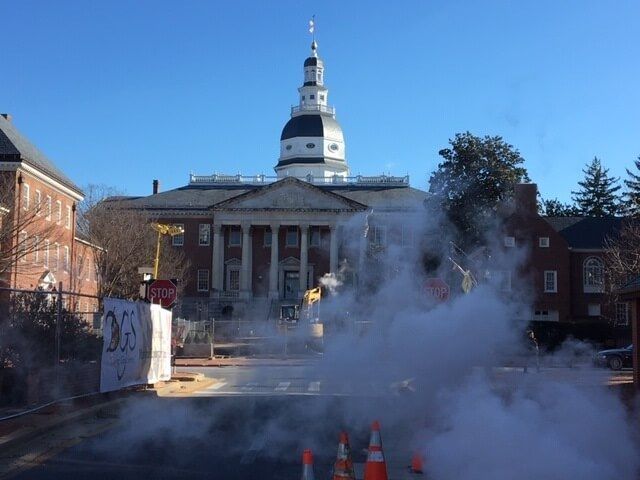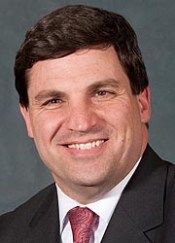This article was republished with permission from WTOP’s news partners at Maryland Matters. Sign up for Maryland Matters’ free email subscription today.
This content was republished with permission from WTOP’s news partners at Maryland Matters. Sign up for Maryland Matters’ free email subscription today.

After days of tension, rumors and burned-up telephone lines, the Senate Democratic Caucus is meeting at 10 a.m. Thursday in Annapolis.
Senate President Thomas V. Mike Miller Jr. (D-Calvert) is expected to give caucus members an update on his health, something he promised to do during the last legislative session. Miller has also announced that he will hold a news conference at noon “to discuss the upcoming legislative session.”
What happens behind closed doors in that two-hour period — or longer, if the caucus meeting drags on — is impossible to predict.
As of late Wednesday, the senators themselves didn’t know. Neither did Miller’s staff.
Even people who have war-gamed different scenarios over the past few days need only look back 5 ½ months, when the House Democratic Caucus met to discuss a replacement for the late Speaker Michael E. Busch (D) and emerged more than four hours later with a compromise candidate, Del. Adrienne A. Jones (D-Baltimore County), who was not even a part of the initial discussion that morning.
What’s prompting this meeting?
Miller, 76, has been receiving treatment for stage 4 prostate cancer and other ailments since January. He’s kept up appearances at public events, including speaking at a memorial service for the late Congressman Elijah E. Cummings (D-Md.) at Morgan State University Wednesday night.
But Miller’s energy is visibly flagging, and after 33 years on the job — he’s believed to be the longest-serving state Senate president in U.S. history — he may be ready to move on. That’s the conclusion that many of his colleagues have, with great sorrow, come to reach.
What could happen?
Miller, the longest-serving Senate president in Maryland history, could announce that he intends to stay in place as president, step down from leadership but remain in office, or retire. Whether he puts a timetable on any departure is anyone’s guess.
What could happen next?
If it’s either of the latter two options, the caucus will then begin to discuss the succession process. What’s not known is whether the vote would happen later Thursday morning or whether senators would agree on another date to make their choice.
Just a few days ago, it seemed inconceivable that a vote would happen immediately. But tensions are running so high within the Democratic caucus that lawmakers may want to lance the boil and resolve the internal controversies quickly.
Who are the players?
If Miller announces a plan to step down, it appears as if the succession battle is between Sen. Bill Ferguson (D-Baltimore City), the vice chairman of the Budget and Taxation Committee, and Sen. Douglas J.J. Peters (D-Prince George’s), the chairman of the Capital Budget Committee.

Ferguson, a late entrant into the race, has momentum and picked up support from two other major contenders earlier this week, Senate Majority Leader Guy J. Guzzone (D-Howard) and Senate Education, Health and Environmental Affairs Committee Chairman Paul G. Pinsky (D-Prince George’s).
Last week, another potential contender, Senate Budget and Taxation Chairwoman Nancy J. King (D-Montgomery), cast her lot with Peters.
According to several senators and head counts by political wise guys and gals, Ferguson as of Wednesday night was ahead, with roughly 18 or 19 committed votes in a caucus with 32 members, including unanimous support from every Baltimore City senator.
But commitments mean little when there’s a secret ballot, and when the caucus’ most powerful member — Miller — was privately expressing a preference for Peters as recently as Tuesday.

Although any new presiding officer would represent significant change after a 33-year incumbency, Peters, an easygoing 55-year-old lifelong Prince Georgian with Miller’s general ideological profile, would represent far more continuity than Ferguson, a 36-year-old progressive who has been in the thick of several recent policy battles.
Ferguson traveled to Miller’s home for a meeting Wednesday, according to multiple sources, but it’s not clear if they struck any kind of agreement. Some senators have suggested that Miller at this stage has done his own head count and is trying to protect Peters and some of his supporters rather than trying to influence the ultimate outcome.
What are the caucus rules?
Uhhhh … there really aren’t any. It’s been a long time since the Senate Democratic caucus has needed to wrangle with rules for a contested leadership election. The last one in was in 1982 — before Ferguson was born.
Democrats are expected to discuss caucus rules at their meeting. Sen. James C. Rosapepe (D-Prince George’s), the caucus chairman, and Senate staffers have been tasked with drawing up rules for leadership elections. Rosapepe will run the meeting — but all eyes will be on Miller.
What about the GOP?
Sorry, Republicans, but it seems like the minority party will not play a larger-than-caucus-size role here as they did in the House speaker race earlier this year. When the House prepared to replace Busch, there was talk of one the potential successors striking a deal with Republicans, despite the Democratic supermajority.
If Miller steps down, all indications from the Democrats, who hold a 32-15 supermajority in the chamber, are that the party will unite around a single candidate for president whenever there is a formal floor vote.







